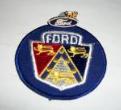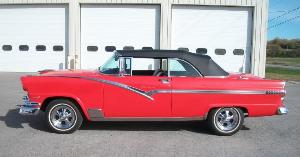|
Group: Forum Members
Last Active: Yesterday
Posts: 234,
Visits: 41.4K
|
I just acquired 2 industrial irrigation engines which were set up for natural gas. A 292 Y-block and a 428. The 428 came with the original manuals & specs showing 9.5 compression ratio. Is it possible to use these engines for gasoline. I have a 56 Victoria and a 57 retractable which could use new engines. Thanks DAVE
SE Wis
|
|
Group: Forum Members
Last Active: Last Year
Posts: 479,
Visits: 10.9K
|
I don't see why not. The Ford engines they use now are the same as the gas engines. Its just the electronics that run the engine is added (an electronic controller, different injectors, etc.). I think if its carburated they start on gas and switch to CNG once its running, but don't quote me on that. Hope this helps, maybe someone else knows more.
Dan Kingman Az. 86409
|
|
Group: Forum Members
Last Active: 9 Years Ago
Posts: 269,
Visits: 1.0K
|
Well, the natural gas conversions are common here. We pay a little more than two US dollars by the LITER of gasoline, with this in mind, there ar a lot of conversions. The converted engines had a loss up to 15% on power, and constant valve and rings problems. This, in my oppinion is caused by the fact that a lot of people just forget about gasoline, and even start their engines on natural gas.
This kind of thing happens when the engine is converted after being running on gasoline for years, and never when the engine runs on gas since new. I use only gasoline on my engines, but have nothing against who does not.
If I were you, I would do a compression test on the engines, change the oil/filter, and use them with gasoline without worry. Just remember to adjust the carbs to gasoline.
Túlio Lazzaroni "FORD", Florianópolis SC Brasil.
'74 Ford Galaxie 500 292 V8
'82 Ford Galaxie Landau 302 V8
'98 Chevrolet S10 4.3 V6
'01 Ford Focus 1.8 Zetec
|
|
Group: Forum Members
Last Active: Yesterday
Posts: 234,
Visits: 41.4K
|
Thanks for the input. I'll give them a compression test & see what I have. Thanks again. Dave
SE Wis
|
|
Group: Forum Members
Last Active: 7 days ago
Posts: 3.7K,
Visits: 32.6K
|
You may be in luck.If the CNG engine is like the propane prepped motors it should have hardened valve seats in the heads.I would switch it to straight gas and run it.
 
|
|
Group: Forum Members
Last Active: 9 Years Ago
Posts: 269,
Visits: 1.0K
|
Never saw a propane engine. The propane is a heavier fuel than natural gas, that's most methane. the combustion of propane is closer to gasoline than methane. What I know, is that the natural gas combustion is "dryer" than gasoline, and propane. Fiat, and VW of Brasil produce cars for use as taxi cabs, with natural gas engines. They also say that the engines must be run on gasoline untill at normal running temperature, and at every start in wich the engine is colder than normal temperature (after sitting for some 20 minutes, for example) The majority of taxi drivers do that, but who has an old V8, and wants to save money, don't. The engines I've seen had broken rings, and lots of damage to the cylinder walls. That's enough to down the value of a good Galaxie, Maverick, or Dart on the local market of more than 20% if it's converted to natural gas. Colectors, will only buy them at lower prices, and after testing the compression.
BUT, if the engines were made to use natural gas, and were well used, they should be fine.
Túlio Lazzaroni "FORD", Florianópolis SC Brasil.
'74 Ford Galaxie 500 292 V8
'82 Ford Galaxie Landau 302 V8
'98 Chevrolet S10 4.3 V6
'01 Ford Focus 1.8 Zetec
|
|
Group: Forum Members
Last Active: Yesterday
Posts: 234,
Visits: 41.4K
|
These engines are designed for natural gas only with the type of carb on them. They were this way since new. The 428 manual says it is a natural gas industrial irrigation engine. It even has an hour meter on it reading 874 hours. I do realize that I will have to change the intake manifolds on these as there is no way to install a gasoline carb on them the way they are. I just wasn't sure if there were internal differences like pistons, rings,valves or heads. From the input here it looks like I should be ok with them. Thanks again Dave
SE Wis
|
|
Group: Forum Members
Last Active: 12 Years Ago
Posts: 190,
Visits: 1.6K
|
I cannot speak to the Ford engines but most engines delivered from the factory to run on natural gas or propane have special valves and hardened seats. Most also have higher compression than their industrial counterparts designed to run on gasoline. Head selection may not be optimal for performance but they will run. Either propane or natural gas is much easier on engine wear than gasoline, and if the engine is designed to run on either propane or natural gas,(compression etc) power will be very close to gasoline.
|
|
Group: Forum Members
Last Active: 9 Years Ago
Posts: 269,
Visits: 1.0K
|
Agreed.
Just to add some more info:
The Natural Gas engines that came on taxies here, are all Flex Fuel engines. That means the engine can run on gasoline, alcohol, or any mix of the two. Those engines all have high compression to burn the alcohol. I believe, that's the reason they are used on cars with the natural gas kits.
With this in mind, looks logical that a higher compression is also good for the natural gas (maybe to prevent power loss?), and the fact that athe engine came from the factory adapted to run on natural gas, AND also run on gasoline, only means it will be fine to run the two V8s on gasoline too. Not only fine, but probably the engines will run really strong, because the compression.
Túlio Lazzaroni "FORD", Florianópolis SC Brasil.
'74 Ford Galaxie 500 292 V8
'82 Ford Galaxie Landau 302 V8
'98 Chevrolet S10 4.3 V6
'01 Ford Focus 1.8 Zetec
|